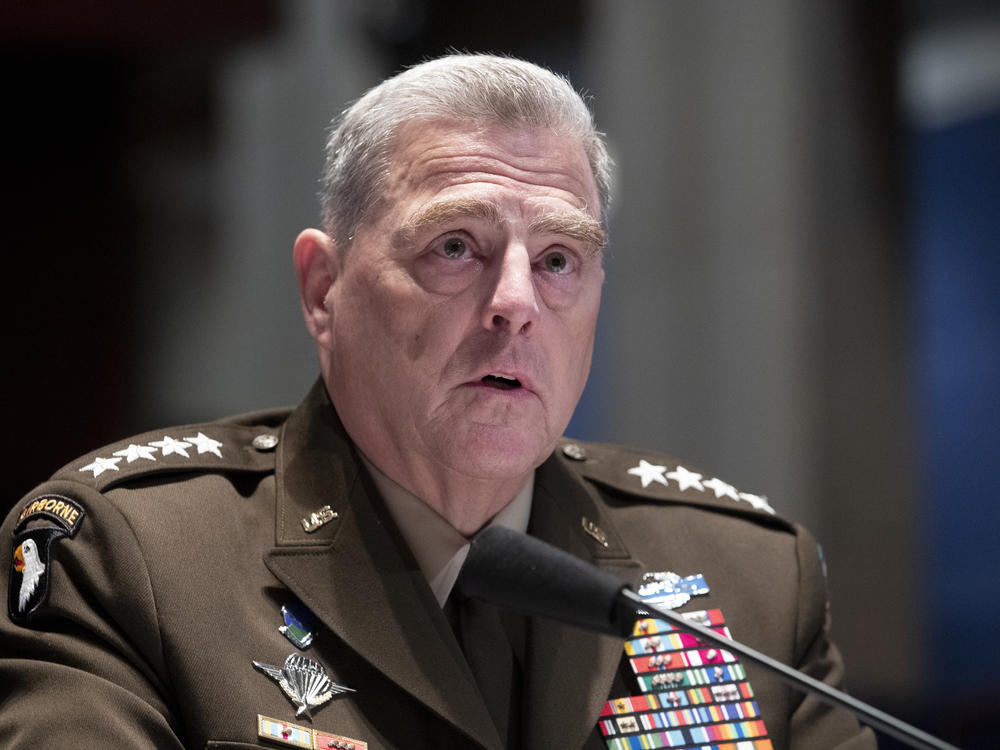Section Branding
Header Content
Gen. Milley: 'We're Trying To End A War Responsibly, Deliberately'
Primary Content
After nearly two decades of fighting, the Trump administration is trying to bring an abrupt end to the war in Afghanistan, and the U.S. military is trying to manage that end effectively.
Last week, President Trump tweeted that American troops "should" be home from Afghanistan by Christmas, while National Security Advisor Robert O'Brien said in a Las Vegas speech that the number of troops there will drop to 2,500 early next year.
In an interview with NPR, the nation's top military officer, Gen. Mark Milley, said he didn't want to get into future numbers, beyond the drop to 4,500 troops next month. Pressed on the number O'Brien used, Milley brushed that comment aside as "speculation," adding that no final decisions have been made by the president and any further reductions must be made with an eye toward conditions on the ground.
"The key here is that we're trying to end a war responsibly, deliberately," Milley said, "and to do it on terms that guarantee the safety of the U.S. vital national security interests that are at stake in Afghanistan."
That has long been the military's view. A string of commanders have said that there's no military solution to the Afghan war, only a political solution with the Taliban. But they insist the country can no longer be a safe haven for terrorist groups like al Qaeda, the perpetrators of the Sept. 11 attacks who enjoyed the Taliban's hospitality in Afghanistan.
Under the February agreement signed by the U.S. and the Taliban, U.S. troops will leave by next spring but only if the Taliban agree to certain conditions, including a break with al Qaeda. So far the Taliban have not done that, and military officials say Taliban fighters are still working with the group.
"I think Milley is being brilliant here," said Michael O'Hanlon, a defense analyst at the Brookings Institution with wide experience in Afghanistan. "No one knows how seriously to take Trump's recent tweet so it's better to focus on substance and on technocratic matters, not which number now reflects policy."
For his part, O'Brien said nothing about substance in his remarks in Las Vegas, only the number of troops down to 2,500. And Pentagon officials were left flat-footed about the speech.
"I can't imagine any reason for O'Brien to have made that remark except for political purposes," said Laurel Miller, who runs the Asia program for the International Crisis Group and who worked at the State Department on Afghanistan issues during the Obama administration. "There is no national security rationale for making a decision right now as to what will have after the next planned drawdown – to 4,500 by the U.S. election – much less announcing what does not seem to be an actual decision."
The competing comments on U.S. troop reductions have caused confusion in Afghanistan. The Taliban welcomed Trump's home by Christmas tweet, while Afghan officials worried there could be an early pullout of American support.
As for Milley's comments, one U.S. official who advises the Afghan government, and requested anonymity because he's not authorized to talk with the press, said the general's dismissal of O'Brien's number was greeted as "great news."
On Twitter, some responded to Milley's comments on O'Brien by saying he was violating civilian control of the military. But retired Army Gen. Tony Thomas, who ran the U.S. Special Operations Command, tweeted that Milley was "solid" in what he had to say.
"NSA (National Security Advisor) is not in the chain of command," Thomas wrote.
All this comes as the Taliban continue talks in Doha, Qatar, with the Afghan government and have also increased attacks on Afghan forces, requiring U.S. forces to come to their aid during the past week in southwestern Helmand Province with some rare airstrikes.
"The Taliban need to immediately stop their offensive actions in Helmand Province and reduce their violence around the country," said Gen. Scott Miller, the American commander in Afghanistan. "It is not consistent with the U.S.-Taliban agreement and undermines the ongoing Afghan peace talks."
Vikram Singh, a former Pentagon official who now works at the U.S. Institute of Peace, said the war has continued now for nearly 20 years at every American force level.
The U.S. troops, he said, "provide some leverage over the parties in the conflict. But it should be clear now that American troops levels have little to do with ending the war."
The Taliban want international support and funds, Singh added.
"The best way to meet those goals is with peace among Afghans. Continuing the war – as the Taliban are doing now with terrible harm to innocent civilians – is always an option. But it's a bad option for all Afghans, including the Taliban," Singh said.
Copyright 2020 NPR. To see more, visit https://www.npr.org.

